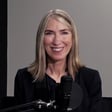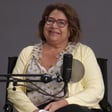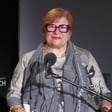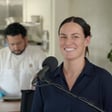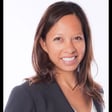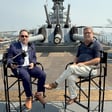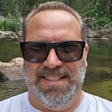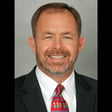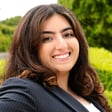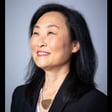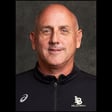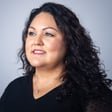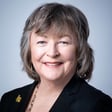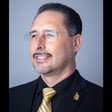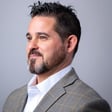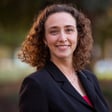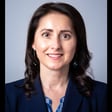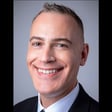Become a Creator today!Start creating today - Share your story with the world!
Start for free
00:00:00
00:00:01

Making 'The Machine' work
Dan interviews assistant VP for URD Operations Nicole Forrest Boggs about the division's operations team and the work they do at CSULB.
Transcript
Introduction to Nicole Forrest Boggs
00:00:16
Speaker
Hello, I'm Dan Montoya, Vice President of University Relations and Development. Welcome to our second season of At the Beach, a podcast that shares the news of accomplishments, personal stories, and ways for listeners to engage at Cal State Long Beach. This podcast is produced by URD. Today, I'm so excited to introduce my guest, Nicole Forrest Boggs, Assistant Vice President for URD Operations.
00:00:41
Speaker
Nicole's role is crucial to the work that we do in URD and across the university. She leads efforts in financial management, philanthropy and stewardship support, scholarship management, reporting and audit compliance, and overall operational infrastructure.
00:00:58
Speaker
Nicole has been a dedicated team member for almost a decade, serving in the leadership roles such as Executive Director of Development and Director of Development for College of Engineering. Her educational background includes a bachelor's degree in economics and an MBA with a marketing emphasis from the University of Laverne, as well as a certification as a plan giving specialist. Nicole's attention to detail and leadership have been essential to our division success. Her colleagues and I rely on her expertise to keep everything running smoothly.
The Backbone of URD Operations
00:01:32
Speaker
Welcome to the podcast, Nicole. Thanks, Dan. I'm really excited to join you to share about division operations.
00:01:39
Speaker
So Nicole, this series that we've been doing is about sharing with the university what university relations and development is and does for the university. So I'm so excited to dig into the operation side and everything that you do. And yours is is kind of like the backbone of URD and it's it's the component that nobody really ever sees, but it's so important because if it doesn't happen, a lot of the functions of our division doesn't happen.
HR and Employee Operations
00:02:07
Speaker
So let's dive into some of the areas you oversee and i I mentioned quite a few. So can you share more about each of these areas starting with HR and explain how they work together to support the URD mission? Sure and I would say division operations were like the machine that keeps everything rolling and moving and grouping. That's right. And university relations and development so HR is the one that touches everybody. We want to ensure that we are recruiting the right people to come work for our division. We're 75 people strong today. We yeah onboard folks, make sure that they feel welcome. They feel comfortable. They're able to get their computer. They're logged into their email. They they know where the bathrooms are.
00:02:53
Speaker
Most important things. HR also um works with evaluations. um We work with leaves of substances. HR is the boring boring, important paperwork stuff that keeps employees happy.
Financial and Procurement Strategies
00:03:10
Speaker
um The next area is fiscal and budget operation. So with fiscal and budget operations, I joke with my colleagues and say that we pay the bills. right What do we do? We pay pay everyone's bills in our division. um And that's a new ah new change that happened in the past years to centralize our bill-paying efforts. We create strategic relationships.
00:03:31
Speaker
with our amazing colleagues in procurement and accounts payable so that we're filling out the right paperwork, um following the rules so that they can do a better job processing all of the important rules and regulations they have to follow by having those experts doing it for our whole division. right So that's our fiscal and budget operations team. Really, the heart and soul, I'd say, of division operations is advancement services. So when you think of advancement services, what's the number one thing We're proud of is all those gifts walking in the door. That's right So who processes all those gifts the amazing Advancement Services team they processed over 8,500 gifts last year. That's amazing
00:04:14
Speaker
And the record keeping process. We want to make sure we record all those gifts. We want to make sure we have a um institutional memory. And so that's database administration. Keeping track of where all of our alums are, where all of our donors are. We're keeping track of if they attended an event. right Are we engaging with them? That is and also part of Advancement Services.
00:04:36
Speaker
And then the fourth area, we have a oh very strong, strong and mighty team is prospect research and data analytics. And so that's taking that great database administration of all of that alumni information. And we're pulling down that big pool of people over 400,000 alums and figuring out We're the best people to get our frontline fundraisers out in front of and talking to. And using all of that ah great analytics, we've been able to um collect on our prospects and our our donors to be strategic because we only have so many people.
Strategic Relationship Building
00:05:10
Speaker
Nicole, your your team is strong and it's really effective and efficient and in a lot of the things that they do. One of the things that I appreciate is the orientation process and it's really improved since I've been here. So I appreciate you for that. I know a lot of the the new employees coming on board ah feel a better sense of connection to the division and to the university. And also just, again, bill's bill paying is so important, right? And there's so much that goes on with that as well. And so before I go into the advancement side, I want to talk about the partnerships that you make, that you've made and all the all the collaboration it takes across the ah university to get these things done. So maybe you can talk a little bit about that and all the areas that you work with across the university.
00:06:05
Speaker
Sure. So for the audience that doesn't know me is that I'm a frontline fundraiser is that that's my background is major gifts and relationships. And so typically someone in my role has a technical background right and doesn't have the frontline fundraising background. Um, so positive negative, you know, I don't have the technical expertise, but that relationship building, um, I really value getting to know the team that works for me as well as getting to know my colleagues, you know, across different divisions. And so.
00:06:35
Speaker
we've We've really, over the past two years, um reached out and gotten and we just asked the question, like what type of insurance do you need um to get a stage set up for a concert? And we're proactive. Our relationships with ah procurement is we are going through the trainings, learning the rules, going above and beyond. and Developing relationships with our procurement colleagues so that we know before we submit the requisition. Great. You need to already have that insurance lined up. You need to, you know, already, you know, have your your three quotes. What's the different dollar threshold we need to meet. um We know all of that information up front. And so it's really. um Respecting their time. I think it's really important to know what our colleagues need to do their job so that we can be prepared we we come to school prepared prepared with our paperwork and Developing through the relationships is I'm just a team shadow away. I'm just a phone call away I reach out to them and they reach out to me. Hey had a quick question. Are we doing this, right? We do that all day long a lot with our accounts payable colleagues before we submit a payment to be processed Do we have the right backup paperwork there?
00:07:43
Speaker
or or Or would you like a supporting email? How can we make your life smoother? Because when your life's smoother, then my people are getting paid faster. Right. And and we appreciate that because you're right. If if you don't do that back-end work,
00:07:58
Speaker
People don't get paid or you know people don't get the trainings or things they need. And so I say that because that's a critical part that a lot of people don't think about. you know When people go to jobs, they think, oh, I get ah yeah benefits and all that, but who coordinates all that? And so that is really your team. I think moving on to prospect management and prospect research.
00:08:20
Speaker
We deal with so much data on ah in our division and it's really, again, protecting the donor's data and making sure that we have accurate data so we can communicate with them and and give them updated information and as as it relates to what they want to hear from the university. So I think that is important as well and making sure that our our data is clean and safe and correct as well. And when we talk about um prospect management and process research is really just helping our DODs um identify those people that they want to reach out and contact. And and because we have such a huge number of database, for example, we have over 400,000 alumni.
00:09:06
Speaker
Obviously, we we don't have all those 400 alumni, 400,000 alumni records for everybody, but we have a lot of them. And so maybe you can speak to some of that and and some of the work that you guys do on that and and how you continue to update it.
00:09:23
Speaker
Sure. So we do an annual biographical screening. And what we do with that screening, usually June, July, is this this is the time of year when we do our screening, is we look for new addresses. So the SAT was once every four years, someone would would move.
00:09:39
Speaker
So about 25% of your database is outdated. wow And so we may be mailing to mom and dad because the data that comes into our system, you're 22, 23, 24, maybe you're 30 when you graduate. yeah Likely you're not going to live at that same address when you're 50. That's right. We're 60. So that's why it's so important. um Data hygiene is the buzz right now is you do you have clean data. um So last year we updated 7.8% of our database with new addresses. Wow.
00:10:09
Speaker
um Emails, the same. We want to update emails. So we updated 19.6% of the database with emails. um And then phone numbers as well phone is becoming less of a channel to connect with people I think that do not call list and cell phones and spam likely people don't want to hear hear from us on the phone right But especially as it relates to our major gift development officers is that's the best way to connect with someone is over the phone so right those those three channels addresses emails and phone numbers we update on and annual basis because we do want to stay connected with you and um My colleagues and university relations on Chris's team, you know, they have some amazing programs like the mentoring program and I need more mentors. And so if we don't have a good database, we're not going to be able to support our current students I think that's one of the big reasons why we're all here is we want to launch some young people out into the world and Encourage them to to choose a profession. That was maybe similar to yours and we need we need that
00:11:10
Speaker
To be able to email you, we need to be able to mail to you. Yeah, that's that's great. ah um And again, it's so critical and important to the work we do. So we're just grateful that we have a strong team that's able to do that as well. And then also your collaboration across the division is so strong. and you and Talk about that in in working with your other colleagues, not just externally from URD, but within the division, I think, and that's one of the things when when we interviewed Kevin and and Chris, they talk about like all that synergy and collaboration that needs to happen. Maybe you can share how you work with them. There's so much synergy and what I like about just Cal State Long Beach and the decade that I've been here is that there's such a great amount of respect for the back of house folks as I feel you they really value the work that we do. um We're not just, oh, you just process our gifts. It's like they really think and appreciate the time and effort that our team takes to send out that thank you letter to process that that tax receipt.
00:12:15
Speaker
So um so we we do, really the work we do, we try to listen and we reach out to the frontline fundraisers and ask, you know what are you focusing on this semester? why What prospects can I find for you in the database system? Because I have a very big pool, but I want to make sure I find the right prospects for you that are speaking to to what you're proud about. you know so So one of my um colleagues, they they're focusing on the tech.
00:12:44
Speaker
the um the tech industry, they're focusing on gaming. And so how can I use my tools? ah We use ah LinkedIn data to find folks working in that initiative that might be interested in learning more yeah about the great work going on in gaming. um So that that's one of the strategies we use with the the frontline development folks, with it which is the Natural Alliance. um And we also partner with alumni. and They're actually great friends because they're driving that data. right They're the ones, and we have an engagement score, and so they're the ones
00:13:16
Speaker
giving us that information of people are mentoring, people are showing up to our talks, people are volunteering with us at commencement. All that great information helps us create the score so we know how engaged someone is at Cal State Long Beach, so how to not bend for the alumni team.
00:13:30
Speaker
to give us the information, we would know if they were engaged or not. We'd probably only have their giving record, which is the way it was five years ago. So we've really evolved in howard how we're tracking our relationship with the folks in our database. Absolutely. And again, a lot of alumni may think, oh, wow, we haven't reached out to them. or We haven't connected with them in quite some time. It's not intentional. Sometimes we just don't have updated information and sometimes people opt out of something that they didn't want to receive at a certain time and then they change their mind, right? And sometimes they have to opt in to receive, you know, information and all that. So listeners out there, if if you're an alum and and you're not receiving information, you'd like to just reach out to our alumni operations and and we can change those
00:14:20
Speaker
ah settings on your record and make sure that you're receiving what you want to do, what you want from the university so that we can communicate with you effectively as well.
Scholarships and Financial Aid Partnerships
00:14:30
Speaker
Nicole, is there a specific area that stands out in your division where you spend most of your time and focus it focus on?
00:14:39
Speaker
So talking about how Nicole spends her time and what's my ah ROI is I would say most of my my time is on gift agreements. I think that's something I'm really proud that every single gift agreement signed at Cal State Long Beach. I have read. I have edited. um We've really developed an amazing partnership with financial aid.
00:14:59
Speaker
um We create a scholarship criteria forum that wasn't in existence a couple years ago And so we have you know seven standard questions. We ask for every single scholarship ah We also um ensure that it'll be able to feed into the scholarship administration system because that the thing you want to do is take someone's money and then say I'm I'm really sorry. We don't really have a way to track this. We can't really find that, you know, gold shining star that the donor is looking for. And so, um you know, from my development background, I can have those, those, you know, strategic conversations with our frontline development officers and really build out opportunities that are
00:15:37
Speaker
matchable to our existing um cast of students. I meet with financial aid twice a month. And um i I know at other schools I've worked at is they have these scholarships that they can award because they were written so narrowly focused they can't they can't find that diamond in the rough.
00:15:54
Speaker
Yeah. And that's a good point because, you know, to educate even our listeners is that our in order for us to really benefit our students, the scholarship has to be more broad now and, you know, to really be available to all students so that they can apply. And so ah we're really looking to create our scholarships in such a way that is accessible to students. And a fun stat, we awarded 2,273 scholarships last year in 2324. That's great. What an amazing impact. Yeah, that's great. And we want to continue to do that, and we will continue to do that as well. One of the things that I'm very proud of with our team is we've really built a, we're beginning to expand and build on the culture of philanthropy at Cal State Long Beach.
Cultivating Philanthropy Culture
00:16:47
Speaker
How does your team contribute to that effort on a daily basis? So I remind our team on a weekly basis that at the end of the day, we're all major gift development officers. And I've even taken members of our team on donor visits with me because I think it's so important to just walk the walk. And what makes me proud is that um donors have had naming events and they invite my Advancement Services team because they've built such amazing rapport with them.
00:17:17
Speaker
is that they are an extension of the philanthropy process. It's not just their prospect manager, but it's the person processing their gift. It's the person accepting that stock transfer. It's the person giving them wiring the wiring instructions. um Every single person you touch is an important relationship builder. And so that's really what the culture of philanthropy is. I try to remind everybody on our team that you are a major gift development officer. this That big win,
00:17:44
Speaker
is everyone's win. right And I think to that point, I will elaborate on that is when when we receive, ah when we create a philanthropic relationship with a donor out there, there's many hands that are involved in creating that experience.
00:18:00
Speaker
And to your point, um having our all our staff understand how that really ties into the relationship that we build with our donors is important. And it plays a critical part in everything that we do. So no gift happens just with one person. It happens with many people and all the teams. So I appreciate you bringing that up because it's very valuable.
Technology in Fundraising Campaigns
00:18:24
Speaker
um So we just finished the no-bearers campaign, you know 313 million um And your team processed a lot of that. So Can you share maybe some key contributions that your team? um You know contributed and any takeaways that you have from that experience?
00:18:40
Speaker
I think the the greatest takeaway from the No Barriers campaign and really, really of, you know, exiting the pandemic was technology, the use of technology. yeah um In 2020, I was at the case conference. We were talking about this thing called DocuSign. What is DocuSign? I'm like, Kevin, Kevin, my friends at San Jose State, they use this this thing called DocuSign. and And I used to have this purple folder and we would route around the purple folder and we'd get the Provo signature and you know, the Dean's signature and it would take forever for Nicole's purple folder to finally make its way to the donor. And now I saw a DocuSign gift agreement get wrapped in seven minutes once. It's amazing how fast DocuSign can, you know, donors want to sign and they're excited. And, um, so technology is just really, um, enhance the way
00:19:30
Speaker
We do work and I think society expects this quick, quick, fast, fast. yep um Another thing is predictive modeling is that we're using predictive modeling. We're looking at what are the past behaviors of our major gift development officers and what's hopefully the future behavior. How can we take that recipe and place it on our 400,000 person pond to find find those new gems using predictive modeling to say, okay, great. And the annual fund,
00:19:56
Speaker
You're a direct mail donor. And so we want to make sure we spend our resources effectively. The people that that like to give via direct mail or maybe, maybe you're an online giver and and that's the channel. Um, so, so we've used technology to really, um, enhance. So we're working smarter, like working smarter or working faster. And, uh, hopefully we're making our donors happier.
00:20:18
Speaker
No, I think, again, you bring up ah an amazing point in technology.
AI Enhancements in Donor Communication
00:20:22
Speaker
um AI is coming to play. And I always say, yeah as I've learned more about it myself and in our role in the and the role we play in philanthropy,
00:20:33
Speaker
It's coming in in so many different phases, right? And I think either you learn it or you get left behind one way or another. And so maybe you can share a little bit about you know what you've learned um about technology. and And I know we use some of it in in ah the different things we do. But what what are what excites you about technology and words taking us in this field. And just just looking at it from a development fundraiser perspective, which is your experience, but also like from a systems perspective. So I'd say with AI, I joke and say I was an economics major, not an English major. So writing is not not my strength. um I'm a numbers person. And so for me personally, AI has really saved me time from staring at that email and rewriting it and, you know,
00:21:22
Speaker
put the here, you know ah just drop it in AI and it spruces it up um for me and and I really appreciate someone smarter or a computer system that's smarter than me to help help me write my emails um and get the point across. So that saved me time personally of mulling over an email. um i I'm really excited to hopefully see how AI can impact our thank you letters. um I would love to personalize our thank you letters more.
00:21:50
Speaker
um How can we use that AI to know, Dan Montoya, you're a College of Business alum, and you you know you graduated. and So you can predict the modeling based on your grad year, where you live, and what you're passionate about. you know if Maybe it can throw in a, hey, and thanks for being and a mentor.
00:22:08
Speaker
so All right, so I'm excited about where we're going to go with technology and what's coming through the pipe. I always talk with these vendors and say, hey, let us be a beta and help test these things. Because I really think that we can use technology in a very creative way and it helps us. It's not about you know, taking shortcuts, it's really about using it to enhance our donors experience and considering that we're a small streamlined shop and and we don't have a lot of bodies, it makes up for having those, not having those positions. So I think that's important, especially in in in our state of ah the CSU and and how we're very, again, streamlined in the process.
Personal Motivation and Student Support
00:22:54
Speaker
So, um
00:22:56
Speaker
On a personal level, what is it about your work at the beach that motivates you and what keeps you inspired every day? So on a personal level, I am a first-generation college graduate. And so i am so my heart just sings with joy when I see our students out there, as I know that they're putting aside a full-time job. they you know They might have obligations at home to help their family with the rent, with the grocery bill. And they are investing in themselves. They're investing in their family's future.
00:23:31
Speaker
and um you know i I had the opportunity to work full-time um at a school district, but I i chose to stay is stay in school and go to college, and I'm i'm so glad I did. and i think it it is um it's ah It's a little bit of like, you want to be there and help your family financially. And so it is it is hard to to say, I'm going to invest in me, and I'm going to you know pursue my degree. But what makes me proud is that I'm the oldest of four kids, and
00:24:02
Speaker
that my other three brothers and sisters have all graduated from college. And so I feel like I was a good a good role model and really helped their trajectory in life. And so I see that in our students, I'm so proud of you know programs like the College of Engineering Best Program as those kids were not calculus ready when they came here to Cal State Long Beach. And you know they're smart kids and they they could be doing tech support.
00:24:25
Speaker
um that doesn't need a college degree, but they are, you know, staying the course, working really hard, getting that engineering degree, and they're going to be so much better in 10 years by like getting that EE degree, that computer science degree, instead of just taking the the tech support route. And so I know they're making sacrifices. They're definitely making sacrifices for their family to stay in school. So it makes me proud to support these students.
00:24:50
Speaker
So as we expand on that, and and I really appreciate your first generational ah yeah ah testimonial, right? Because it's it's a beautiful thing, right? When you are changing the next generation, ah not just your brothers and sisters, but your kids. like It's not a matter of if they're going to college, it's where, right? And that's the beauty of it. And so that's what I love about commencement.
00:25:16
Speaker
and you are part of a great team that helps move all the students across the stage,
Commencement Ceremony Reflections
00:25:23
Speaker
right? So give your perspective of what you feel like watching these students walk across the stage and you see all the families out there in the stands and you see there their nervousness to to just have that one, it's not even 15 seconds of fame, it's like three seconds. And give your perspective on that because I know i know it's a very fun time for us.
00:25:48
Speaker
Yeah, it's an amazing time. So last year, um I was able to stand stand on the stage and can say congratulations to just about every single student that crossed that stage. And they're so, um they are so nervous. It's so, it's cute to see like they're fumbling with their little piece of paper and they're, um you know, this is This is it. like This is the moment that their families have been waiting for. um And it's just such a such a point of pride. um When they they step on that stage, they ah shake they shake the hand of their their department chair.
00:26:24
Speaker
um is that they it's It's that culminating experience that I did it. you know They and made it. They made it and they've they've had a long journey. So I just, I'm smiling if you can see me. I'm like, I'm so proud of them. I just have that mom moment is I'm just so proud that like you did it. You, you focused, you put the time and effort in.
00:26:47
Speaker
um You've had a great support structure and we're all just so so proud of you. Yeah, I don't think there's any more significant moment Especially when the undergrads say move that tassel over everybody goes crazy. I think that's such an amazing moment. So So um as we can ah as we come closer to the end, we always aim to connect supporters with the heart of the beat, right? It's people and programs. So how can listeners and their network support the important work that you and your team are doing?
Alumni Engagement and Support
00:27:24
Speaker
Well, I think something that funders look at is how many donations are we receiving? What's our alumni participation rate?
00:27:32
Speaker
i think if an alum could even send in $50 is that that gift not only does certainly make an impact and make a difference, but it also shows corporations, it shows our major fundraisers that we are investment worthy.
00:27:48
Speaker
um you know living Living in this community, I see folks wearing the LB hats and the LB shirts. And even when I'm on vacation, like I was in, I think it was in Bryce, and I had my LB hat on. Are you from Long Beach? Is there so much pride? And so I think we can continue and sustain that pride.
00:28:08
Speaker
and hire long beach grads and really propel that that beach community and to go above and beyond is to to make a $50 gift, make a donation so that we can report that that that the funding is there on top of just the pride, which is which is hard to quantify. But it's easy for me as a numbers person to quantify here is our alumni participation rate.
00:28:32
Speaker
Yeah, no, I think you're right and there's so many different ways to connect and we encourage all our alumni and and just community members who want to reach out to us to reach out through our alumni ah website and and we will definitely connect you in and help point you in the right direction.
Conclusion and Appreciation
00:28:50
Speaker
So ah in this series, I've asked, ah you know, Kevin and Chris to kind of wrap up and a small couple sentences, you know, what your division does and and and because I want people to remember in a few words, you know, what your division is, it does and how relevant it is to the institution. So maybe you can give us a real quick summary and snapshot of your division and why it's important to the institution.
00:29:19
Speaker
I think our division is the machine that keeps fundraising moving at the beach. I love it. Yeah, that's true. It's because it's it's the it's the pistons. it's It's the oil. It's the fire that keeps that engine going. So I appreciate that so good. Well, Nicole, I don't know. I just got to say i I appreciate your leadership. I've seen you grow in so many different ways. I appreciate all your team and I tell you what, you your team on Fridays is a lot of fun to be around. There's always some kind of a pilot or celebration going on. And what that says to me is they enjoy working together. And I think we've created this great culture of unity here in UR&D. And so thank you for continuing to foster that. Thank you for continuing to help grow it. And thank you for all the work that you do.
00:30:12
Speaker
thank you So this concludes another edition of At the Beach. I'm your host, Dan Montoya, Vice President for University Relations and Development, which proudly produces this podcast. Thank you for tuning in. Thank you for tuning in. And as always, we like to close our podcast with a Go Beach on three. One, two, three. Go Beach.
